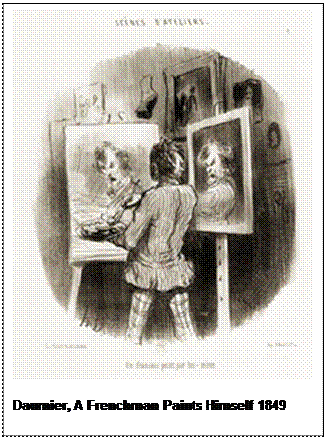HENRI MURGER'S BOHEMIANS OF THE LATIN QUARTER (1851)
CHAPTER XVI
The Passage of the Red Sea (Selections)

For five or six years Marcel had worked at the famous painting which (he said) represented the Passage of the Red Sea; and for five or six years, this masterpiece of color had been obstinately refused by the jury. In fact, by dint of going and returning so many times from the artist's study to the Exhibition, and from the Exhibition to the study, the picture knew the road to the Louvre well enough to have gone thither of itself, if it had been put on wheels. Marcel, who had repainted the canvas ten times over, from top to bottom, attributed to personal hostility on the part of the jury the ostracism which annually repulsed him from the large saloon; nevertheless he was not totally discouraged by the obstinate rejection which greeted him at every Exhibition. He was comfortably established in the persuasion that his picture was, on a somewhat smaller scale, the pendant required by "The Marriage of Cana," that gigantic masterpiece whose astonishing brilliancy the dust of three centuries has not been able to tarnish. Accordingly, every year at the epoch of the Exhibition, Marcel sent his great work to the jury of examiners; only, to deceive them, he would change some details of his picture, and the title of it, without disturbing the general composition.
Thus, it came before the jury once, under the name of "The Passage of the Rubicon," but Pharaoh, badly disguised under the mantle of Ceaser, was recognized and rejected with all the honors due him. Next year, Marcel threw a coat of white over the foreground, to imitate snow, planted a fir tree in one corner, and dressing an Egyptian like a grenadier of the Imperial Guard, christened his picture, "The Passage of the Beresina."
But the jury had wiped its glasses that day, and were not to be duped by this new stratagem. It recognized the pertinacious picture by a thundering big pie-bald horse that was prancing on top of a wave of the Red Sea. The skin of this horse served Marcel for all his experiments in coloring; he used to call it, familiarly, his "synoptic table of fine tones," because it reproduced the most varied combinations of color, with the different plays of light and shade. Once again, however, the jury could not find black balls enough to refuse "The Passage of Beresina."
"Very well," said Marcel, "I thought so! Next year, I shall send it under the title of 'The Passage of the Panoramas.'"
"They're going to be jolly caught -- caught!" sang Schaunard to a new air of his own composition; a terrible air, like a gamut of thunder-claps, the accompaniment whereof was a terror to all pianos within hearing.
"How can they refuse it, without all the vermilion of my Red Sea mounting to their cheeks, and covering them with the blush of shame?" ejaculated the artist, as he gazed on his picture. "When I think that there is five hundred francs' worth of color there, and at least a million of genius, without counting my lovely youth, now as bald as my old hat! But they shan't get the better of me! Till my dying day, I will send them my picture. It shall be engraved on their memories."
"The surest way of ever having it engraved," said Colline, in a plaintive tone, and then added to himself, "very neat, that; I shall repeat it in society!"
Marcel continued his imprecations, which Schaunard continued to put to music.
"Ah they won't admit me! The government pays them, lodges them, and gives them decorations, on purpose to refuse me once a year; every first of March! I see their idea! I see it clearly! They want to make me burn my brushes. They hope that when my Red Sea is refused, I will throw myself out of the window of despair. But they little know the heart of man, if they think to take me thus. I will not wait for the opening of the Exhibition. From today, my work shall be a picture of Damocles, eternally suspended over their existence. I will send it once a week to each of them, at his home in the bosom of his family; in the very heart of his private life. It shall trouble their domestic joys; they shall find their roasts burnt, their wines sour, and their wives bitter! They will grow mad rapidly, and go to the Institute in strait-waistcoats. Ha! Ha! The thought consoles me." . . .